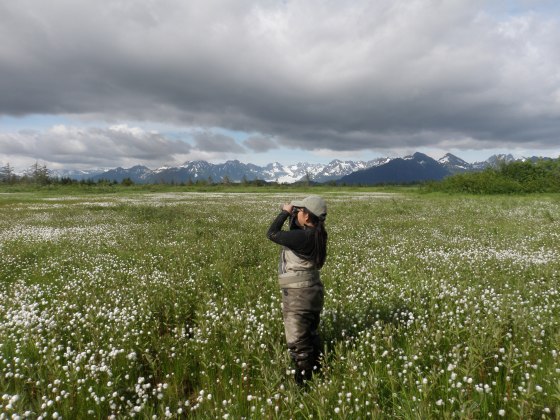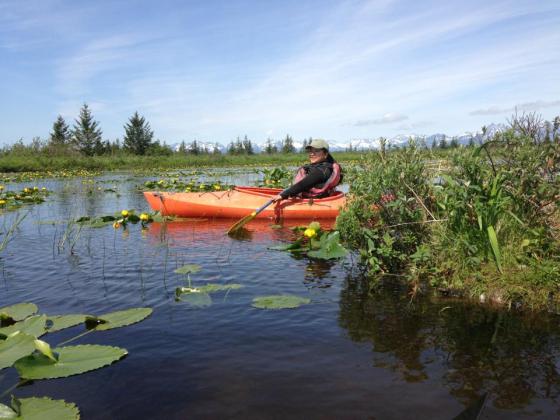The wildlife crew in Cordova is in mid fieldwork season! From shorebird surveys to native plant gardens, invasive plant control and our latest project Dusky Canada Goose Nest Island monitoring. We were out on Pete Dahl, our field camp on the Delta for one week of monitoring the success of nest on artificial nest islands. These were long days of walking in wetlands, paddling in ponds and sloughs and recording data from over 350 nest islands. With this internship I have had the opportunity to experience different kinds of fieldwork. Being out on the Delta has been one of the harder fieldwork projects I have done but the incredible wildlife we see out there makes all the hard work worth it. After a long day of monitoring nest islands with no nest, with nests and egg shells from hatched goslings arriving to a nest with 5 eggs that are hatching makes the day and all the work we do worth it.
We saw many birds and bird chicks that also breed in the Delta like Red-necked Phalaropes, Short-billed Dowitchers, Common Snipe, Ring-necked Ducks, Mallard Ducks, Horned Grebe, Arctic and Aleutian Terns, Lincoln’s Sparrows and Rusty Black Birds among other birds. During one of the days of monitoring Erin, my supervisor and I found a Swan’s nest with 4 eggs!
Dusky Canada Geese Artificial Nest Islands
The Dusky is a subspecies of Canada goose that breeds primarily in the Copper River Delta in south central Alaska. The dusky has one of the smallest populations of geese in North America. Its population has drastically declined due to habitat changes caused by the uplift from the 1964 earthquake. The Dusky Canada Goose management plan was created by multi-state agencies along with the Forest Service in response to such decline in Dusky Canada geese. The artificial nest island program has been a key tool for the plan on the Copper River Delta. Artificial nest islands in ponds have increased the success of Dusky Canada Geese. There are over 350 artificial nest islands in the Copper River Delta. According to data collected in previous years, nest on artificial islands are more than twice as likely to succeed than natural nests on shore. The nest islands provide increased protection from predators like bears and other mammals.

